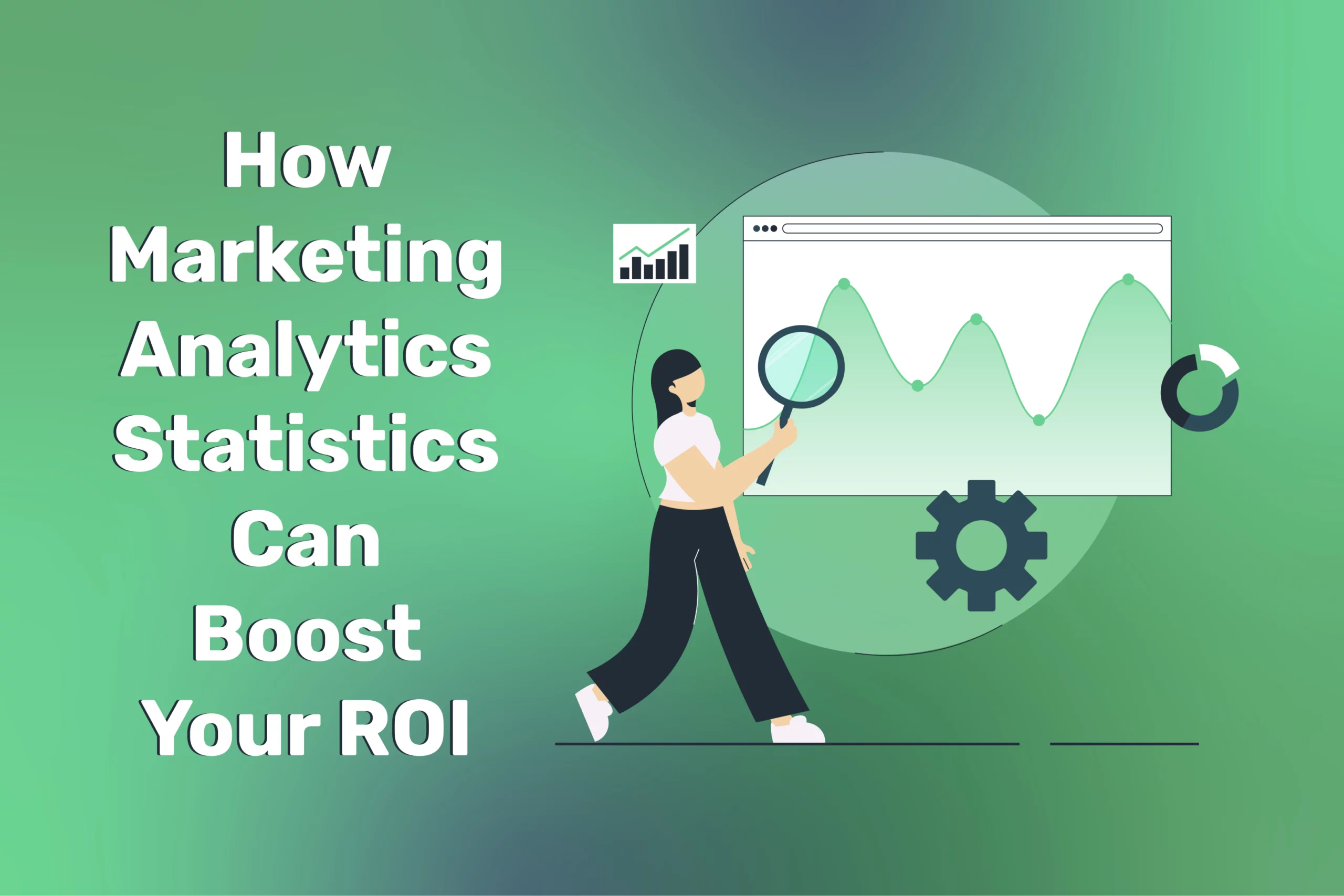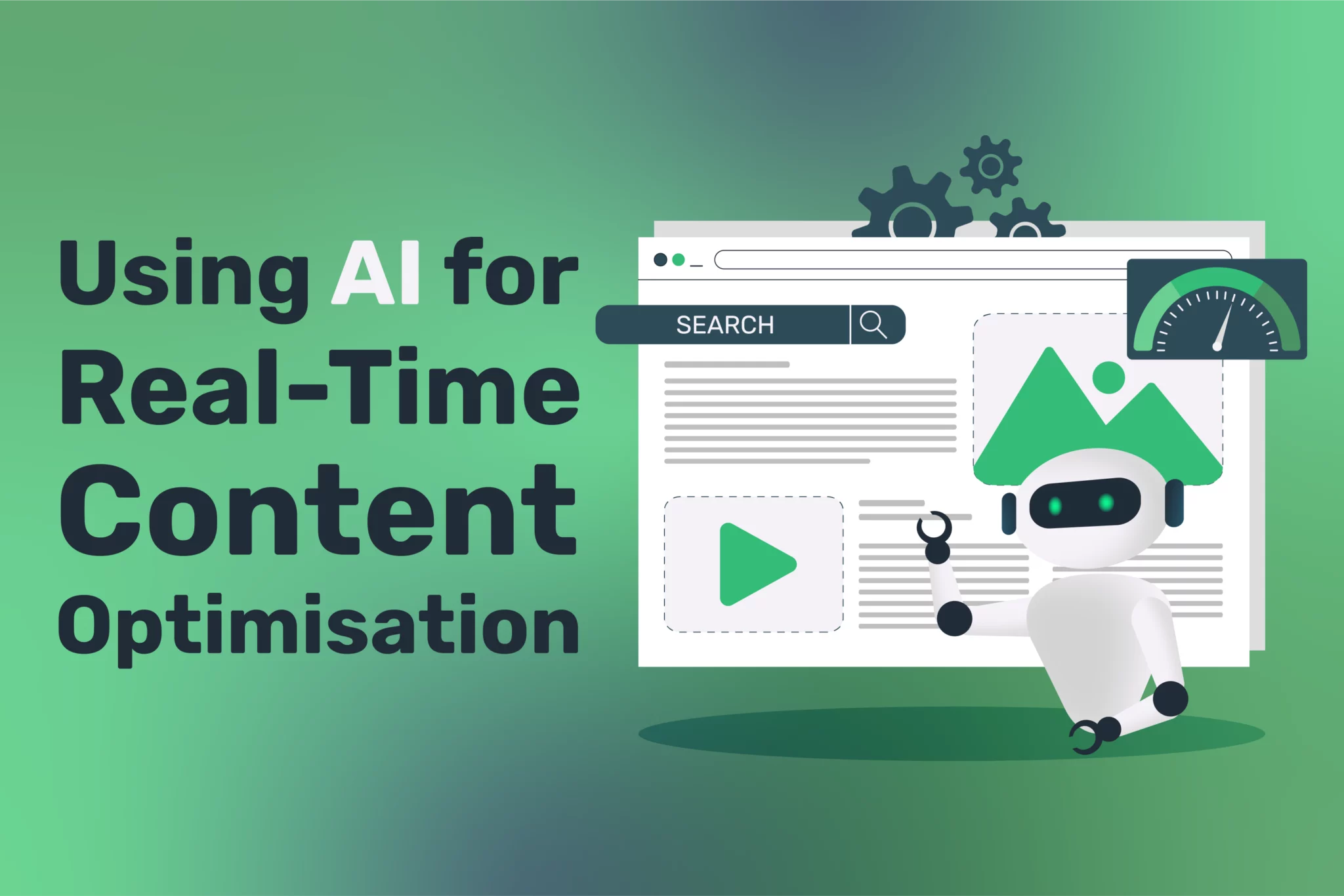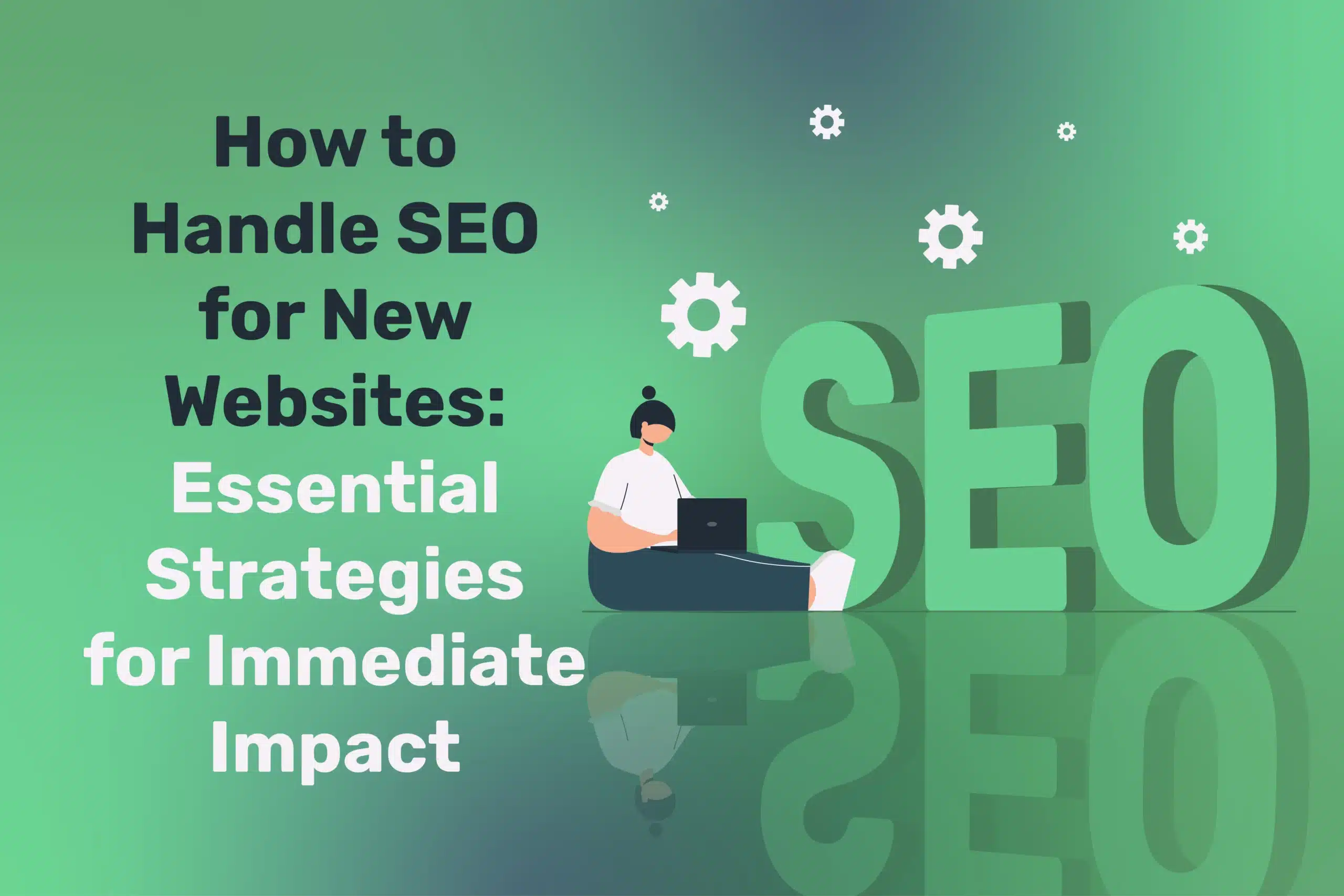
AI in GreenTech: Driving Sustainability Innovation Across Ireland, NI, and the UK
Table of Contents
As climate change and ecological concerns intensify, GreenTech—the application of technology to foster sustainability—has become a crucial focus for governments and businesses across Ireland, Northern Ireland, and the UK. Artificial intelligence now stands at the forefront of GreenTech innovation, optimising renewable energy systems, predicting environmental changes, and advancing eco-friendly solutions. This comprehensive analysis examines how AI and GreenTech intersect to create new business opportunities and drive sustainability-focused growth.
“We see AI bridging data insights and real-world ecological impact, from smarter wind farm management to advanced recycling solutions. GreenTech is no longer a niche sector—it’s a pressing global imperative,” says Ciaran Connolly, Director of ProfileTree.
Understanding AI in GreenTech
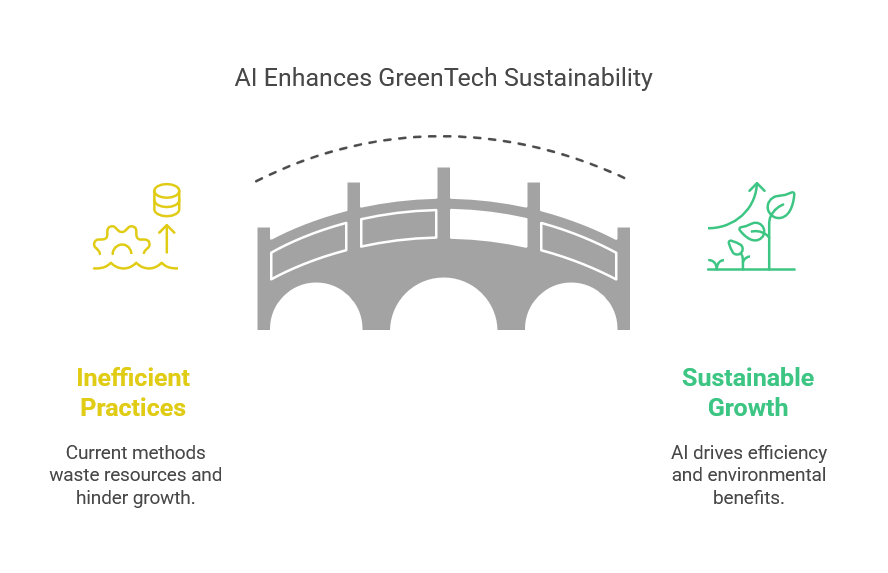
Artificial intelligence is transforming GreenTech by enabling more efficient and sustainable practices across various sectors. From optimising renewable energy systems to enhancing waste management and precision farming, AI is unlocking new opportunities to address environmental challenges and drive sustainable growth.
The Scope of GreenTech
GreenTech encompasses a broad range of sustainability-focused sectors including renewable energy generation, sustainable agriculture, waste reduction, carbon footprint management, and water conservation. AI’s fundamental role is to analyse complex environmental data sets—such as wind pattern predictions or water consumption metrics—and deliver real-time, optimised recommendations that enhance efficiency and reduce environmental impact.
Regional Relevance and Applications
In Ireland, wind energy represents a rapidly expanding sector where AI can forecast wind patterns for improved turbine scheduling and output optimisation. Northern Ireland’s ambitious zero-waste recycling initiatives benefit from AI-powered sorting systems and optimised logistics. Meanwhile, the UK government’s substantial investments in carbon capture technologies leverage machine learning to track carbon metrics and improve sequestration efficiency.
Environmental Data Processing
AI excels at processing the massive environmental datasets necessary for effective sustainability planning:
- Analysing satellite imagery to monitor deforestation, coastal erosion, and habitat changes
- Processing IoT sensor networks that track air quality, water conditions, and soil health
- Integrating weather forecasting with energy demand models for grid optimisation
- Mapping carbon emissions and offsets across complex supply chains
Transformative AI-Driven GreenTech Applications
AI is revolutionising GreenTech with innovative solutions that optimise energy use, improve waste management, and enhance resource efficiency. These transformative applications are driving sustainability efforts across industries, significantly reducing environmental impact while boosting operational performance.
Renewable Energy Optimisation
Sophisticated AI systems gather and analyse weather data from locations such as Ireland’s west coast or the English moors to predict solar and wind energy availability with unprecedented accuracy. These systems help energy grid operators balance load supply and demand in real-time, ensuring minimal energy wastage while maximising renewable utilisation. This technological synergy significantly reduces operational costs and accelerates renewable energy adoption rates.
Intelligent Waste Management & Recycling
Computer vision-based AI deployed in waste-sorting facilities can identify and categorise materials with high precision, effectively separating plastics, metals, paper, and organic waste. Several local councils across Northern Ireland are testing these advanced sorting solutions to reduce landfill dependency. Advanced analytics systems further optimise waste collection by planning more efficient routes for collection vehicles, reducing fuel consumption and associated emissions.
Precision Agriculture and Sustainable Farming
Farmers in rural regions such as Cork or Tyrone increasingly deploy machine learning systems to monitor soil moisture levels, identify pest patterns, and predict optimal harvest times. These precision farming approaches enable targeted application of fertilisers and pesticides only when and where essential, significantly reducing chemical runoff while improving crop yields and preserving soil health.
Smart Water Management
AI-powered systems monitor water infrastructure to detect leaks, predict maintenance needs, and optimise distribution networks. For water-intensive industries across the UK, these technologies can reduce consumption by 15-30% through real-time monitoring and automated adjustments based on operational requirements.
“Small-scale optimisations like route planning improvements or targeted fertiliser application may seem minor individually, but collectively, these AI-driven efficiencies can dramatically reduce environmental impact across the UK and Ireland,” states Ciaran Connolly.
Business Benefits of Adopting Green AI Solutions
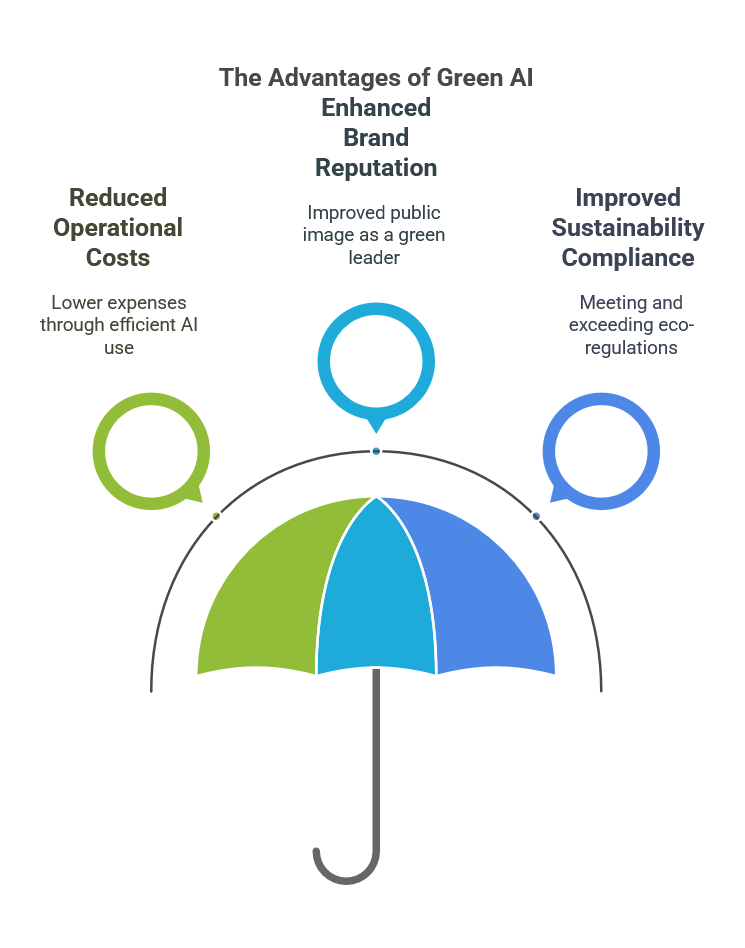
Adopting Green AI solutions offers businesses significant advantages, including reduced operational costs, enhanced brand reputation, and improved compliance with sustainability regulations. These benefits not only drive profitability but also position companies as leaders in environmental responsibility.
Operational Cost Reductions
Optimising energy consumption and resource allocation through AI delivers substantial operational savings. For example, an AI-driven building management system implemented in a Belfast office complex might reduce energy expenditure by 20–30% through intelligent heating, cooling, and lighting control. Over time, these accumulated savings free up capital for business growth and further sustainability investments.
Enhanced ESG Performance and Consumer Appeal
Environmentally conscious consumers increasingly favour brands with demonstrable sustainability credentials. Showcasing AI-based carbon footprint reduction initiatives or improved recycling efficiency can attract new customers and strengthen existing relationships. This resonates strongly in local communities, fostering brand loyalty and positive word-of-mouth marketing.
Regulatory Compliance and Future-Proofing
With the UK’s legally binding net-zero emissions targets and Ireland’s comprehensive climate action plan, businesses across numerous sectors must reduce their environmental footprint systematically. AI can provide real-time compliance monitoring and predictive analytics to ensure organisations meet current legal requirements while preparing for increasingly stringent future regulations, thereby avoiding penalties and reputational damage.
Innovation and Competitive Differentiation
Companies that successfully integrate AI and sustainability initiatives often discover unexpected innovation opportunities. These may include new product development, service enhancements, or entirely new business models based on circular economy principles, creating meaningful competitive differentiation in crowded markets.
Building E-E-A-T Credibility in Sustainability Content
Establishing credibility in sustainability content requires a focus on Expertise, Authoritativeness, and Trustworthiness (E-E-A-T). By showcasing real-world implementations, referencing authoritative sources, and maintaining transparency, businesses can build trust with their audience and strengthen their environmental reputation.
Demonstrating Experience Through Implementation
Share authentic, localised case studies: “Our AI-based route optimisation system reduced delivery mileage for our Limerick fleet by 15%, cutting both costs and emissions.” This first-hand implementation data establishes credibility and practical expertise. Include visual documentation or client testimonials to provide tangible evidence of successful outcomes.
Establishing Expertise Through Authoritative Information
Reference official climate data and research from respected sources such as the Environmental Protection Agency (EPA), the UK Department for Energy Security and Net Zero, or academic institutions. If your organisation collaborates with environmental scientists or GreenTech specialists, highlight their qualifications and contributions to underscore your content’s authority.
Building Trust Through Transparency and Verification
Maintain complete transparency regarding your sustainability achievements, supported by independent verification. If your business implements AI-based recycling systems, publish accurate metrics about materials diverted from landfill, backed by third-party audits rather than unsubstantiated claims.
Demonstrating Accountability for Claims
Acknowledge limitations and challenges alongside successes. This balanced approach demonstrates integrity and commitment to continuous improvement rather than performative sustainability marketing.
“Being transparent about your environmental impact—supported by verifiable data and independent validation—builds genuine credibility with audiences who increasingly demand authentic sustainability commitments,” emphasises Ciaran Connolly.
Implementation Challenges and Solutions
Implementing GreenTech AI solutions presents challenges such as data limitations, high initial investment, and skill gaps. However, with strategic planning, collaboration, and phased implementation, businesses can overcome these obstacles and successfully integrate AI for sustainability.
Addressing Data Limitations
Effective GreenTech AI systems require comprehensive datasets, including local weather records, energy consumption histories, and environmental monitoring information. In rural or less connected regions, reliable data may be fragmented or held by different organisations, complicating model development. Solutions include:
- Partnering with local universities for data collection projects
- Implementing IoT sensor networks to gather organisation-specific data
- Collaborating with regional authorities on data-sharing initiatives
- Utilising transfer learning techniques to adapt models despite limited local data
Managing Investment Requirements
Implementing advanced sensor networks or machine learning-based forecasting systems often requires significant initial investment, potentially challenging for small and medium enterprises. Financial approaches to address this include:
- Applying for innovation grants from Innovate UK, Enterprise Ireland, or EU funding programmes
- Phased implementation starting with high-ROI applications
- Exploring equipment leasing or as-a-service models
- Joining collaborative industry initiatives to share development costs
Developing Specialised Expertise
The intersection of artificial intelligence and sustainability requires multidisciplinary knowledge that remains relatively scarce. To address this skills gap, organisations can:
- Partner with local universities for knowledge transfer programmes
- Engage specialised consultancies for initial implementation
- Invest in upskilling existing technical staff
- Develop internship programmes with environmental science departments
Ensuring Algorithmic Transparency
As AI systems increasingly influence environmental decision-making, ensuring transparency and explainability becomes crucial for maintaining stakeholder trust. Best practices include:
- Documenting data sources and model development methodologies
- Implementing explainable AI techniques where possible
- Establishing regular external review processes
- Creating accessible dashboards showing key performance indicators
Detailed Regional GreenTech AI Use Cases
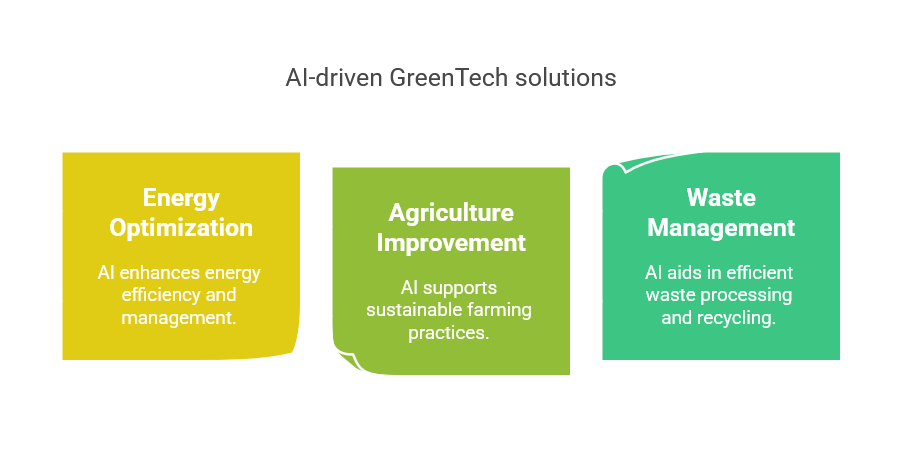
Across Ireland, Northern Ireland, and the UK, AI-driven GreenTech solutions are being implemented in various sectors. These regional use cases highlight the tangible impact of AI in optimising energy, agriculture, waste management, and more, driving local sustainability efforts.
Intelligent Grid Management in Northern Ireland
A Northern Ireland power utility has implemented AI forecasting to predict daily energy demand patterns with 95% accuracy. The system recommends optimal energy source allocation based on weather forecasts, suggesting increased wind energy utilisation when detecting favourable conditions near the Antrim Coast. This real-time balancing reduces fossil fuel backup generation dependence, lowering carbon emissions while maintaining reliable service.
AI-Enhanced Livestock Management near Galway
Dairy farms in the Galway region have continuously deployed computer vision systems to monitor cattle health and behaviour. These systems detect early indicators of illness or stress, enabling timely interventions and appropriate adjustments to feed or care regimens. This approach minimises antibiotic usage, improves animal welfare, and aligns production with sustainable, humane farming practices valued by consumers.
Smart Waste Management in Urban Centres
Local authorities in cities like Belfast, Dublin, and Manchester have begun integrating IoT sensors into public waste bins to monitor fill levels in real-time. AI algorithms process this data to optimise collection schedules and routes, dispatching vehicles only when and where needed. Initial implementations show fuel savings of 20-30%, corresponding emissions reductions, and improved urban cleanliness through prevented overflows.
Predictive Flood Management in Wales
Welsh water authorities have implemented AI-based systems that integrate weather forecasts, river level sensors, and topographical data to predict flooding risks with unprecedented accuracy. These systems enable proactive measures such as controlled water releases from reservoirs and targeted deployment of flood defences, significantly reducing property damage and emergency response costs.
Integrating AI into everyday municipal operations and agricultural practices delivers both environmental benefits and operational efficiencies—an attractive proposition for local governments and businesses facing resource constraints,” comments Ciaran Connolly.
Strategic Implementation Framework for SMEs
For SMEs looking to adopt GreenTech AI, a structured approach is essential. This framework outlines key steps, from setting sustainability goals to data infrastructure development, ensuring effective and scalable AI implementation that delivers both environmental and business benefits.
Assessment and Goal Setting
- Identify specific sustainability objectives aligned with business priorities, such as reducing energy consumption by 15% or minimising water usage in manufacturing processes
- Establish measurable baseline metrics for environmental performance
- Prioritise initiatives based on potential environmental impact, cost savings, and implementation feasibility
Data Infrastructure Development
- Conduct a comprehensive audit of existing environmental and operational data
- Identify data gaps and implement appropriate monitoring systems or sensors
- Establish data governance protocols ensuring quality, consistency, and security
- Develop integration pathways with existing business intelligence systems
Technology Selection and Implementation
- Evaluate available AI solutions focusing on sustainability applications
- Consider both commercial platforms and open-source frameworks like TensorFlow or PyTorch
- Implement a controlled pilot programme focusing on a single site or system
- Monitor performance improvements and cost impacts against established baselines
Scale and Optimisation
- Assess pilot results against predetermined success criteria
- Refine models and processes based on initial implementation learnings
- Develop a phased expansion plan for deployment across multiple locations or systems
- Implement continuous improvement protocols to maintain effectiveness
Communication and Reporting
- Document methodologies, achievements, and learnings in detail
- Develop comprehensive reporting aligned with recognised sustainability frameworks
- Share results through appropriate channels including website content, social media, and industry forums
- Connect initiatives to relevant regional and national climate targets
A structured, measured approach to GreenTech AI implementation ensures businesses can realise tangible benefits while managing risks and resource commitments effectively,” advises Ciaran Connolly.
Digital Marketing and SEO Advantages
Leveraging GreenTech AI initiatives not only drives sustainability but also enhances digital marketing and SEO efforts. By showcasing innovative solutions and gaining media attention, businesses can improve brand visibility, acquire high-quality backlinks, and boost local search performance.
Enhanced Brand Visibility and Recognition
Innovative AI sustainability initiatives frequently attract media attention, particularly when they address regional environmental challenges. This coverage generates valuable brand awareness and increased search visibility. As publications and industry organisations reference your environmental innovations, direct brand searches increase—a powerful signal to search engines that enhances overall domain authority.
High-Quality Backlink Acquisition
Sustainability success stories featuring tangible results and innovative approaches naturally attract editorial coverage from environmental publications, local news outlets, and industry resources. This organic link-building through quality content creates sustainable improvements to search visibility without artificial tactics.
Engaging Multimedia Content Opportunities
Visual documentation of GreenTech implementations—such as drone footage of AI-optimised renewable installations or data visualisations showing environmental improvements—creates compelling content for social platforms. These materials drive engagement and traffic while establishing your organisation as a visible sustainability leader.
Local SEO Enhancement
Sustainability initiatives with specific regional relevance strengthen local search performance. Businesses can improve visibility for location-specific searches while building community connections by addressing environmental challenges in areas like Belfast, Cork, or Manchester.
Authentic sustainability achievements naturally generate media interest and organic content sharing. This coverage creates valuable backlinks and brand visibility that significantly enhance your digital presence,” remarks Ciaran Connolly.
Change Management and Long-Term Success
Successfully integrating GreenTech AI requires effective change management strategies. By fostering internal support, ensuring technical sustainability, and adapting to evolving technologies, businesses can achieve long-term success while driving continuous improvement in their sustainability efforts.
Building Internal Support
Successful GreenTech AI implementation requires broad organisational buy-in. Some staff members may express concerns about technological changes or unfamiliar processes. Effective approaches include:
- Providing comprehensive training highlighting how AI tools enhance rather than replace human capabilities
- Communicating the organisation’s sustainability vision and each team’s contribution
- Celebrating early wins and sharing success metrics transparently
- Establishing feedback mechanisms to address concerns constructively
Ensuring Technical Sustainability
GreenTech AI solutions require ongoing maintenance and refinement to maintain effectiveness as conditions evolve:
- Implement regular model retraining schedules incorporating new data
- Establish performance monitoring protocols with clear review triggers
- Budget appropriately for system updates and technical support
- Document all systems thoroughly to prevent knowledge loss during staff transitions
Adapting to Regional Variations
When scaling successful pilots across multiple locations, consider regional differences that may affect performance:
- Climate variations between different parts of Ireland and the UK
- Regulatory differences across jurisdictions
- Local infrastructure and resource availability
- Regional cultural attitudes toward sustainability and technology
Preparing for Technological Evolution
The rapid advancement of both AI and sustainability technologies requires forward-looking strategies:
- Maintain awareness of emerging technological developments
- Build flexible systems capable of incorporating new capabilities
- Establish innovation budgets for testing promising new approaches
- Participate in industry forums and knowledge-sharing networks
The Future of AI-Powered Sustainability
Integrating artificial intelligence into sustainability initiatives represents a transformational approach to addressing environmental challenges across Ireland, Northern Ireland, and the UK. By harnessing AI capabilities to optimise energy usage, enhance resource efficiency, and minimise ecological impacts, organisations simultaneously reduce operational costs and environmental footprints.
This technological evolution enables businesses of all sizes to contribute meaningfully to regional and national sustainability goals while discovering new opportunities for innovation and competitive differentiation. The most successful implementations combine technical excellence with transparent communication, establishing genuine credibility through verifiable results and honest reporting of achievements and challenges.
As governments across the region implement increasingly ambitious climate policies and consumers prioritise environmental responsibility, businesses that effectively leverage AI for sustainability will establish leadership positions in their respective sectors. These organisations create multi-dimensional value: improving operational efficiency, enhancing brand perception, supporting regulatory compliance, and contributing to crucial environmental protection.
The most successful organisations will integrate both technological innovation and environmental responsibility into their core business strategy. When efficiency improvements align with reduced environmental impact, businesses create sustainable competitive advantages while contributing to our collective climate goals,” concludes Ciaran Connolly.
Sector-Specific Applications and Opportunities
Different industries across the UK and Ireland face unique sustainability challenges that AI can help address:
Manufacturing and Production
- Real-time energy consumption optimisation for production equipment
- Predictive maintenance reducing resource waste and extending equipment lifespan
- Supply chain optimisation minimising transport emissions and material usage
- Quality control systems reducing defects and associated material waste
Retail and Consumer Goods
- Demand forecasting reducing overproduction and inventory waste
- Transparent supply chain monitoring for sustainability verification
- Smart packaging solutions optimised for recycling or biodegradability
- Customer-facing applications highlighting product sustainability credentials
Construction and Infrastructure
- AI-optimised building designs maximising energy efficiency
- Materials selection assistants identifying sustainable alternatives
- Construction waste reduction through precision material ordering
- Smart building management systems minimising operational footprints
Transport and Logistics
- Route optimisation reducing fuel consumption and emissions
- Fleet electrification planning based on usage patterns
- Predictive maintenance extending vehicle lifespan
- Delivery consolidation minimising partial load journeys
Tourism and Hospitality
- Smart energy management in accommodation facilities
- Food waste reduction through AI-powered inventory and portion control
- Water conservation systems for hotels and recreational facilities
- Sustainable tourism recommendation engines promoting low-impact activities
Building Regional Leadership in GreenTech AI
Ireland, Northern Ireland, and the UK possess unique advantages for developing leadership in AI-powered sustainability solutions:
Research and Innovation Networks
The region’s world-class universities and research institutions provide exceptional foundations for GreenTech innovation:
- University collaborations focused on region-specific environmental challenges
- Innovation hubs specialising in sustainability technologies
- Public-private research partnerships addressing specific industry needs
- Knowledge transfer networks connecting academic research with practical applications
Supportive Policy Environments
Government initiatives across the region increasingly support sustainable technology adoption:
- Innovation grants specifically targeting sustainability solutions
- Regulatory Frameworks Encouraging Environmental Technology Adoption
- Public procurement preferences for sustainable technologies
- Tax incentives for qualifying green investments
Growing Talent Ecosystems
The development of specialised educational programmes creates vital talent pipelines:
- Dedicated degree programmes in environmental data science
- Professional certification in sustainable AI applications
- Industry-sponsored research positions in key universities
- Internship programmes connecting students with GreenTech employers
By leveraging these regional advantages while addressing specific local environmental challenges, organisations across Ireland, Northern Ireland, and the UK can establish distinctive capabilities in AI-powered sustainability solutions with global relevance and impact.
